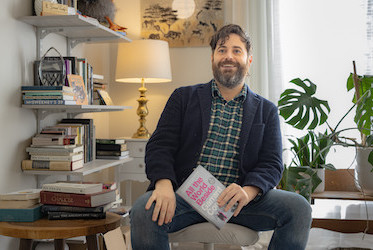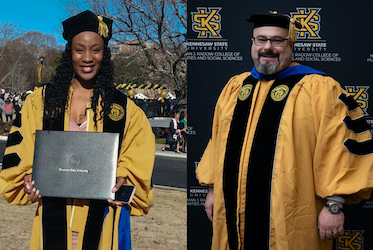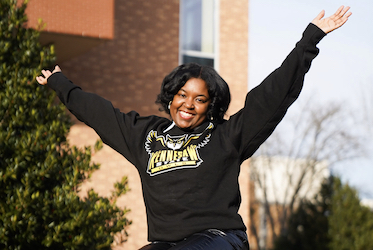
Something to Say
KENNESAW, Ga. | Nov 5, 2018
Researcher gives a voice to Southern hip-hop
The story of the South is told in its music and from its people. Regina Bradley, assistant professor of English and African Diaspora Studies, is a storyteller. Research, fiction and teaching all inform and build into the experience she sees in the South.
Albany, Georgia remains one of the poorest areas of Georgia and it’s this city where Bradley first felt the roots of the black southern experience. “Albany is a living civil rights monument. The Civil Rights Institute is here, and a lot of people who marched for civil rights are still there,” she said. “I grew up around that.”
While growing up in Albany, Bradley wanted to just listen to hip-hop but her grandparents steered her towards books and furthering her education. They supported her learning as much as she could.

The conversation between the past and the present followed her through her arrival to Albany State University. She was the third generation of her family to get degrees from Albany State and even once she graduated and left to pursue her graduate degree at Indiana University, the South stayed with her.
It wasn’t until graduate school that she realized she had something to add to the conversation as a researcher. When a Black Music seminar addressed the importance of hip-hop, but only mentioned groups from the Northeast or the West, she asked about the role of Southern hip-hop and found a gap in the conversation. “I asked about why all this rap music coming from the south was overlooked and she said, ‘What are you going to do about it?’ I didn’t know at the time, but that started me thinking.”
When she moved to Florida to pursue her Ph.D. at Florida State University she began pursuing the importance of how hip-hop tells the story of America after the Civil Rights Movement. It wasn’t until after graduating with her degree that she began to think more deeply about the significance of southern hip hop. “When you think about Southern Black experiences, it’s linked to three major historical moments: antebellum, Reconstruction and Jim Crow, and the civil rights movement. And after that? That’s it. So where do people born after those eras fit in? Hip-hop is a tool for us to move past 1968,” Bradley said. The stories found in hip-hop bridge that gap and tell the story of the modern south experience.
“The South got something to say,” Bradley quotes, a moment from the speech André ‘3000’ Benjamin, of the duo OutKast, gave when they accepted their best new Rap Group at the 1995 Source Awards.
OutKast features prominently in Bradley’s research as one of the first Southern hip-hop groups to reach prominence. Originating in the heart of Atlanta, the duo’s first album Southernplayalisticadillacmuzik spoke heavily of the Black South experience and exploded in popularity. Bradley wanted to examine the impact of this southern duo on hip-hop and of telling the story of the South.
“I started a series about OutKast and what they have to say about the black experience in the South,” she said. “It was supposed to be a short project, but it ended up being a lot longer than that.”
The project called, “OutKasted Conversations,” took form as a series of interviews on YouTube discussing the academic, cultural and regional influence of the hip-hop group. Speaking with fans, artists, and scholars, the 40-video long series dives into the significance of OutKast’s music and how it helps understand African-American popular culture. The series has been featured in Ebony, The New York Times, Musiqology, For Harriet, Huffington Post, and The Feminist Wire.
Now she’s in the process of writing a book about the relationship of hip-hop and the South in the time after the Civil Rights Movement. The book, Chronicling Stankonia: OutKast and the Rise of the Hip Hop South, will explore the role that OutKast played in influencing the views of the black American South after the movement. The book is forthcoming from UNC Chapel Hill press, and she’s also in the process of editing a collection of essays about OutKast for the University of Georgia press.
But her research isn’t her only method for exploring the story of the south after the civil rights movement. “I can’t fully remove my life experiences from my research,” Bradley said. Bradley is also an accomplished fiction writer. Her 2017 short fiction collection, Boondock Kollage: Stories from the Hip-Hop South, addressed many of the same ideas that influence her research: race, place, and identity. One of those short stories is being expanded into a full-length novel, tentatively titled The Ghosts Come Home, under the guidance of Tayari Jones, author of An American Marriage, an Oprah’s Book Club selection.
Bradley’s skill with storytelling translates into her classes. She’s found her ‘signature class’ with her cross-listed English and American Studies course “Chronicling Stankonia: America’s Hip Hop South’ where she leads discussions on hip-hop, identity, and southernness. The class has proven so popular, she’s teaching it again in the Spring as well as a class looking at the OWN series, Queen Sugar.
Teaching the students to look at the world through a new lens helps them better see themselves and the world around them.
“You can find ways to apply these lessons to your life. How you see yourself influences a lot of understanding of the text,” Bradley said. “Storytelling helps them bridge that gap.”
But out of all of the lessons she wants her students to take away from her class, there’s one that’s of vital importance in all of her classes. “I always tell my students to claim your brilliance. Just because someone told you where your talents don’t lie, doesn’t mean you can’t pursue it.”
For Bradley, teaching hip-hop is more than just her own passion project, it’s a way to help students find their voice and continue to tell the stories of the world around them because the South still got something to say.
– Andrea Judy
Photos by David Caselli
Related Stories
A leader in innovative teaching and learning, Kennesaw State University offers undergraduate, graduate and doctoral degrees to its more than 45,000 students. Kennesaw State is a member of the University System of Georgia with 11 academic colleges. The university’s vibrant campus culture, diverse population, strong global ties and entrepreneurial spirit draw students from throughout the country and the world. Kennesaw State is a Carnegie-designated doctoral research institution (R2), placing it among an elite group of only 7 percent of U.S. colleges and universities with an R1 or R2 status. For more information, visit kennesaw.edu.



















